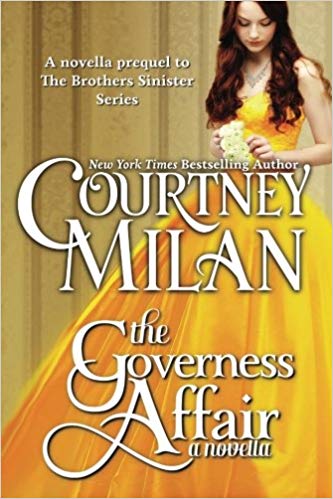 The Governess Affair (Brothers Sinister, #0.5) by Courtney Milan
The Governess Affair (Brothers Sinister, #0.5) by Courtney Milan Format: ebook
Source: purchased from Amazon
Formats available: paperback, ebook, audiobook
Genres: historical romance
Series: Brothers Sinister #0.5
Pages: 96
Published by Courtney Milan on April 21st 2012
Purchasing Info: Author's Website, Amazon, Barnes & Noble, Kobo, Bookshop.org
Goodreads
She will not give up. Three months ago, governess Serena Barton was let go from her position. Unable to find new work, she's demanding compensation from the man who got her sacked: a petty, selfish, swinish duke. But it's not the duke she fears. It's his merciless man of business -- the man known as the Wolf of Clermont. The formidable former pugilist has a black reputation for handling all the duke's dirty business, and when the duke turns her case over to him, she doesn't stand a chance. But she can't stop trying -- not with her entire future at stake.He cannot give in.Hugo Marshall is a man of ruthless ambition -- a characteristic that has served him well, elevating the coal miner's son to the right hand man of a duke. When his employer orders him to get rid of the pestering governess by fair means or foul, it's just another day at the office. Unfortunately, fair means don't work on Serena, and as he comes to know her, he discovers that he can't bear to use foul ones. But everything he has worked for depends upon seeing her gone. He'll have to choose between the life that he needs, and the woman he is coming to love... The Governess Affair is a novella of about 32,500 words.
My Review:
Courtney Milan is an author who has been highly recommended to me on multiple occasions. After reading The Governess Affair I certainly understand why.
This wasn’t quite what I expected based on the blurb – but in a good way. I haven’t been reading as much romance as I used to, particularly historical romance, because the characters and the situation have become increasingly difficult to identify with. Love may conquer a lot, but it doesn’t conquer ALL.
Heroines with agency often feel anachronistic, while heroines without agency just aren’t worth bothering with.
But The Governess Affair was an extremely pleasant surprise. Heroine Serena Barton has grabbed her agency with both hands and is hanging onto it as if it is her only hope – because it is. Even though the deck is stacked high against her from the very beginning, she never lets go. At the same time the way that she takes that agency feels like it fits into her time and place. Because what she is demanding is her due in that time and place – no more and no less.
The hero, Hugo Marshall, is every bit as fascinating because he’s the kind of person that we know must have existed but doesn’t usually find himself the hero of a romance. He’s not particularly handsome. Not that he’s ugly either, just that he’s relatively ordinary.
He’s definitely not an aristocrat. In fact, the aristocrat is the villain of this piece and deservedly so.
Instead, Hugo Marshall works for a living. Admittedly he begins the story as the villainous aristocrat’s “fixer”, but it is definitely work. Hugo’s not striving for a life of idle luxury, just enough money and contacts to stake himself in business. He’s ambitious, hard-working and just plain hard. (Take that wherever your imagination wants to go)
But Serena has made herself a problem for Hugo’s employer. It’s Hugo’s job to eliminate his employer’s problems – one way or another.
He doesn’t resort to murder. It’s not that kind of problem elimination. Hugo’s usual methods are payoffs and ruination.
The problem is that Serena doesn’t want a small payoff because it won’t be enough to fix HER problems. And he really can’t ruin her because his employer has already done that.
And Hugo discovers that he can’t bring himself to do it again – no matter how much his own future rides on the outcome.
Escape Rating A-: I’ve had this book in my virtually towering TBR pile for almost seven years. It zoomed to the top of that rather large pile this week when the news of the dumpster fire at the Romance Writers of America broke on Xmas Eve. It’s a story of WTF’ery, of tone policing, of organizational idiocy, of having no clue about the way that social media works on the eve of 2020, and of trying to lock the barn door after the horse has gone while attempting to pretend that there was never a horse in the first place AND blaming the jockey for raising the alarm about the missing equine. A brief summary – with documents – can be found at Smart Bitches, Trashy Books. The TL;DR version is that RWA officially blamed an author of color for calling out racism in the industry and pretty much the entire industry except the pearl-clutchers clapped back. HARD. Courtney Milan is the author blamed for calling out her own experience. So I wanted to send love both in the form of a review of something I had already purchased and the purchase of something new.
Which led to a deep dive into that TBR stack to see what I had on tap. And this is one of the things I had, the prequel novella in her Brothers Sinister series (The entire rest of the series was the purchase of something new). And it was a lovely read.
As is obvious from my comments above the rating, I liked both Serena and Hugh very much. And I’m saying that even though Serena’s predicament isn’t one I usually have much interest in reading about. Because the story isn’t ABOUT her pregnancy. It’s about her taking her future in her own hands and standing up for her own self in a society that expects her to do neither.
And I loved her internal voice, that she’s standing up NOW because she didn’t stand up then. She gave up her own voice once and it cost her dearly. She refuses to do it again – no matter what follows.
I found the relationship between her and her sister Freddy fascinating on multiple levels, and not just because Freddy clearly has agoraphobia. The way that the sisters love each other, support each other and have absolutely no understanding of each other all at the same time feels so real. I identify with Serena’s position completely while still being able to see where Freddy is coming from – even knowing that she would drive me bonkers too.
Hugh’s aspirations and his work ethic make him a different kind of hero for a story set in England in the immediate post-Regency period. The only member of the aristocracy we really see is Hugh’s employer, who is essentially the rotter that kicks off the whole story. He doesn’t get nearly as much as he deserves. What I loved about the story is that, at least in Hugh’s internal voice, the glitter of the Regency is exposed for the sham it was – or at least the sham the “nobility” were.
 The romance between Serena and Hugh is an enemies into lovers romance that sparkles with wit and banter. They fall in love by talking to each other with both of their keen intellects on display at every turn.
The romance between Serena and Hugh is an enemies into lovers romance that sparkles with wit and banter. They fall in love by talking to each other with both of their keen intellects on display at every turn.
I also loved the way that Hugh helped Serena get past her trauma. The sensitivity of that scene reminded me very much – and very favorably – of a similar occurrence in Lady Abigail’s Perfect Match.
The end of The Governess Affair is a teaser for the first complete novel in the Brothers Sinister series, The Duchess War. And at the end of my reading of The Governess Affair, while I decry the reason I found myself hunting this book up, I’m glad that I finally did.

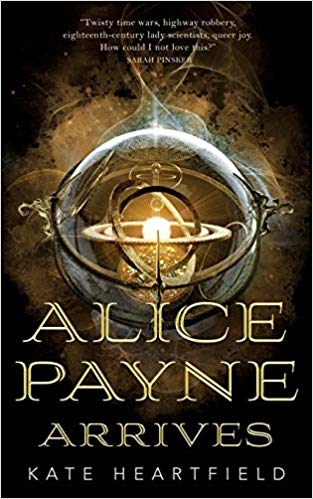 Alice Payne Arrives (Alice Payne, #1) by
Alice Payne Arrives (Alice Payne, #1) by 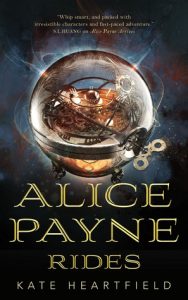 Prudence is trying to stop time travel. Alice’s story is easy. It takes the reader a while to understand why Prudence feels like she needs to essentially commit treason – and we get enough to grasp what’s wrong by the tip of our reading fingernails without understanding it in quite as much depth as I’d like. The ending felt both a bit rushed and a bit of a tease for the next book in the series.
Prudence is trying to stop time travel. Alice’s story is easy. It takes the reader a while to understand why Prudence feels like she needs to essentially commit treason – and we get enough to grasp what’s wrong by the tip of our reading fingernails without understanding it in quite as much depth as I’d like. The ending felt both a bit rushed and a bit of a tease for the next book in the series.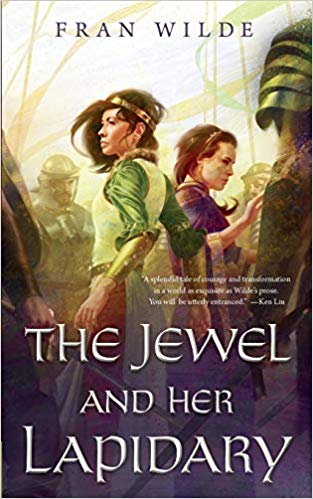 The Jewel and Her Lapidary (Gem Universe #1) by
The Jewel and Her Lapidary (Gem Universe #1) by 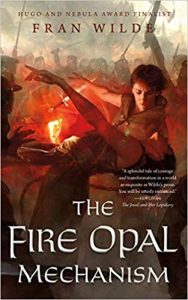 Escape Rating A-: This story is probably the shortest epic fantasy ever written. And it doesn’t seem to sacrifice anything for its tiny length. Not that I wouldn’t have loved to have had more backstory and character building and setup and everything – because I always want more of all of those things. And not that I’m not hoping to get more of those things from the next book in the series,
Escape Rating A-: This story is probably the shortest epic fantasy ever written. And it doesn’t seem to sacrifice anything for its tiny length. Not that I wouldn’t have loved to have had more backstory and character building and setup and everything – because I always want more of all of those things. And not that I’m not hoping to get more of those things from the next book in the series, 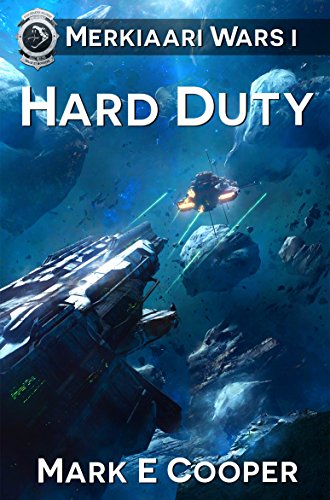 Hard Duty (Merkiaari Wars #1) by
Hard Duty (Merkiaari Wars #1) by  The Girl Who Reads on the Métro by
The Girl Who Reads on the Métro by  Accidentally Yours by
Accidentally Yours by 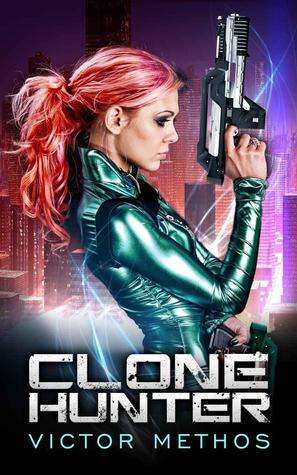 Clone Hunter by
Clone Hunter by 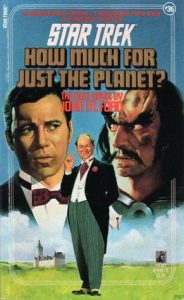 If we’d seen snippets of things that interlaced and came together for one big finale, as in John M. Ford’s
If we’d seen snippets of things that interlaced and came together for one big finale, as in John M. Ford’s 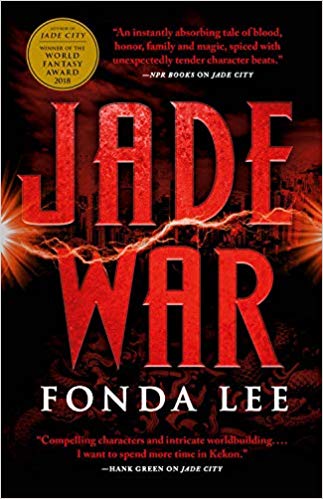 Jade War (The Green Bone Saga, #2) by
Jade War (The Green Bone Saga, #2) by 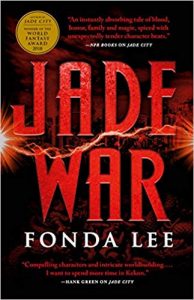 I picked up Jade War just about the minute I finished the absolutely awesome
I picked up Jade War just about the minute I finished the absolutely awesome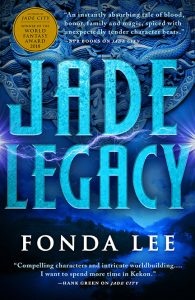 Jade War also takes this story of gangland warfare to a wider stage while telling a tale that provides standout roles for the women as well as the men of the clan AND adds a fascinating dose of world-wide political skulduggery to what was initially an urban fantasy about warring criminal organizations. The Green Bone Saga was a terrific story when it was confined to two families and one city. Now that it has gone world-wide, it is epic in every sense of the word. This is one of those books that just needs a higher grade than A+. Seriously, all the stars for this one.
Jade War also takes this story of gangland warfare to a wider stage while telling a tale that provides standout roles for the women as well as the men of the clan AND adds a fascinating dose of world-wide political skulduggery to what was initially an urban fantasy about warring criminal organizations. The Green Bone Saga was a terrific story when it was confined to two families and one city. Now that it has gone world-wide, it is epic in every sense of the word. This is one of those books that just needs a higher grade than A+. Seriously, all the stars for this one.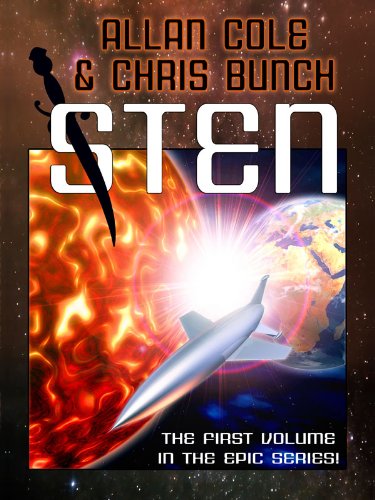 Sten by
Sten by  H2O by
H2O by